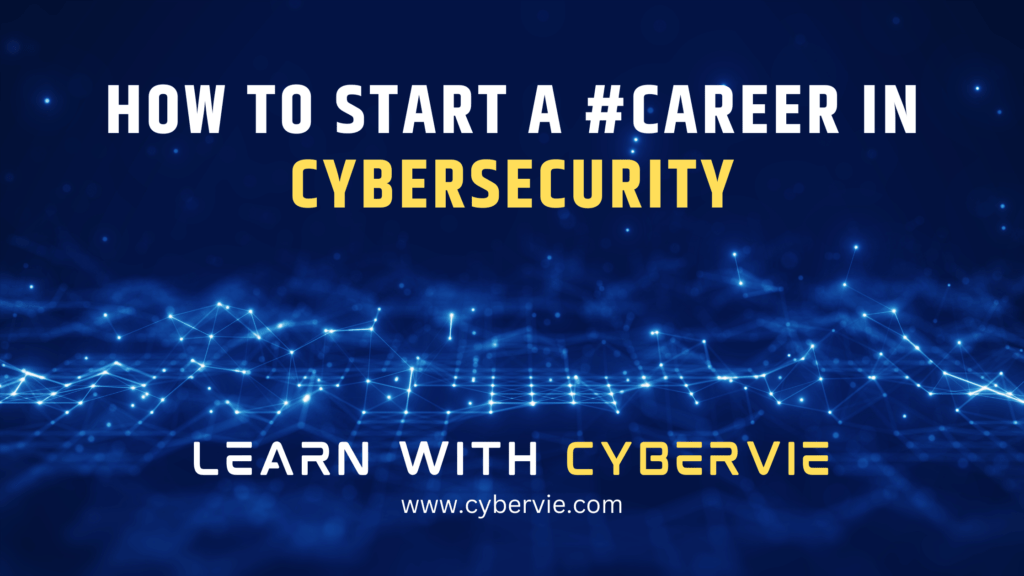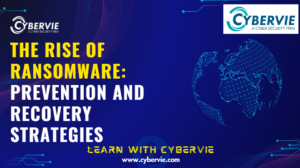How to Start a Career in Cybersecurity: A Step-by-Step Guide
The world is becoming increasingly digital, and with that, the demand for cybersecurity professionals is skyrocketing. If you’re intrigued by the idea of protecting data and thwarting cyber threats, Starting a Career in Cybersecurity might be the right path for you. But how do you get started? This step-by-step guide will walk you through the process on how to start a successful career in cybersecurity.
Cybersecurity isn’t just a dynamic and rewarding career field; it’s also critically important in today’s tech-driven world. As we rely more on digital platforms, the need for security becomes more pressing.
The question isn’t just “Is cybersecurity a good career?” but rather “Are you ready to step up to the challenge?“
Understanding Cybersecurity
Before you dive into a cybersecurity career, it’s important to understand what it entails.
“Cybersecurity, also known as information security (infosec), is the practice of protecting systems, networks, and programs from digital attacks. These cyberattacks are usually aimed at assessing, changing, or destroying sensitive information, extorting money from users, or interrupting normal business processes.”
Step 1: Assess Your Current Skills and Interests
Identify Your Aptitude for Cybersecurity
Do you have a knack for solving puzzles? Are you interested in technology and how it works? Cybersecurity might be a good fit if you have a curious mindset and enjoy thinking like a hacker to prevent cyberattacks.
Evaluate Your Technical Background
Although a technical background is beneficial, it’s not a must-have to start a career in cybersecurity. Many successful cybersecurity professionals come from diverse backgrounds and have learned on the job or through formal education.
Essential Skills for Cybersecurity:
- Technical Skills: Knowledge of IT systems, networks, and programming.
- Analytical Skills: Ability to analyze threats and vulnerabilities.
- Problem-Solving Skills: Finding solutions to security issues.
- Communication Skills: Explaining technical information clearly.
Step 2: Get Educated
Pursue Formal Education
While not mandatory, a degree in cybersecurity, computer science, information technology, or a related field can be a significant asset. Look for programs that offer hands-on experience with the latest cybersecurity tools and technologies.
Explore Certifications
Certifications can provide specialized knowledge and demonstrate your commitment to the field. Consider starting with entry-level certifications like Certified Security Engineer Professional (CSEP), CompTIA Security+, or Certified Ethical Hacker (CEH).
Stay Updated on Cybersecurity Trends
The cybersecurity landscape is constantly changing. Follow industry news, blogs, and forums to keep up with the latest threats and defense strategies.
Step 3: Gain Practical Experience
Internships and Entry-Level Positions
Internships can be a gateway to the cybersecurity field. Entry-level positions, such as a security analyst or IT support role, can also help you build a foundation of practical skills.
Personal Projects and Labs
Set up your cybersecurity lab at home to practice your skills. You can also contribute to open-source projects or participate in hackathons and capture-the-flag (CTF) competitions to gain real-world experience.
Ways to Gain Experience:
- Internships: Many organizations offer internships for hands-on experience.
- Labs and Simulations: Use online labs and simulations to practice.
- Volunteer Work: Offer your skills to non-profits or small businesses.
Step 4: Network and Connect
Join Professional Organizations
Organizations like Cybervie, (ISC)², ISACA, and local cybersecurity groups offer networking opportunities, resources, and events that can help you connect with professionals in the field.
Attend Conferences and Workshops
Cybersecurity conferences and workshops are excellent places to learn from experts and meet potential employers. Make sure to engage with speakers and attendees to expand your professional network.
Leverage Social Media
Platforms like LinkedIn and Twitter are valuable tools for connecting with cybersecurity professionals and companies. Engage with the community by sharing articles, joining discussions, and showcasing your expertise.
Step 5: Specialize Your Skills
Once you have a solid foundation in cybersecurity, you can choose to specialize in a particular area. Specializations include penetration testing, cybersecurity analysis, incident response, or security architecture. Determine which area aligns with your interests and strengths, and focus on developing those skills.
Step 6: Continue Learning and Growing
Cybersecurity is ever-evolving, so it’s crucial to keep learning. Attend advanced training sessions, pursue higher-level certifications, and stay abreast of the latest cybersecurity advancements to advance your career.
Common Cybersecurity Career Paths
Security Analyst
Security analysts are responsible for protecting company networks and systems. They analyze security measures, monitor for breaches, and respond to incidents.
Penetration Tester
Penetration testers, or ethical hackers, are hired to legally break into systems to identify vulnerabilities. They provide critical insights into how to strengthen security postures.
Incident Responder
Incident responders act quickly to combat security breaches. They investigate cyberattacks, mitigate damage, and work on recovery strategies.
Cybersecurity Manager
Cybersecurity managers oversee security operations and often manage a team of security professionals. They develop and implement security strategies to protect an organization’s assets.
Is Cybersecurity a Good Career?
Cybersecurity offers a range of benefits, including high demand for skilled professionals, good salaries, and the opportunity to work in various industries. It also provides a sense of purpose, as you’ll defend valuable information from cyber threats.
Preparing for the Job Market
Build a Strong Resume
Highlight your education, certifications, experience, and any special projects or achievements relevant to cybersecurity. Tailor your resume to each job you apply for, emphasizing the skills and experiences that match the job description.
Tips for a Strong Cyber Security Resume:
- Highlight Certifications: List relevant certifications prominently.
- Detail Experience: Describe your practical experience and key achievements.
- Customize for Each Job: Tailor your resume to match the job description.
Prepare for Interviews
Be ready to discuss your technical skills, problem-solving abilities, and how you stay updated on cybersecurity trends. Practice common interview questions and scenarios to articulate your qualifications confidently.
Resources:
Consider Security Clearances
A security clearance may be required for certain cybersecurity roles, especially those related to government or defense. Research the process and be prepared to undergo background checks if necessary.
Ready to take your Cybersecurity skills to the next level?
Join our CSEP – Advanced Training Program and become a leader in AI-powered cybersecurity.
Click Here to Enroll CSEP Advanced Training Program
Final Thoughts
Starting a career in cybersecurity requires dedication, continuous learning, and a proactive approach. By following this guide, you can build a strong foundation, gain valuable experience, and find your place in this exciting and essential field.
Remember, cybersecurity isn’t just about technical skills; it’s also about understanding risks, communicating effectively, and staying one step ahead of cyber threats. If you’re ready to take on the challenge, the world of cybersecurity awaits you.
For More Related Blog Contents – Click Here







